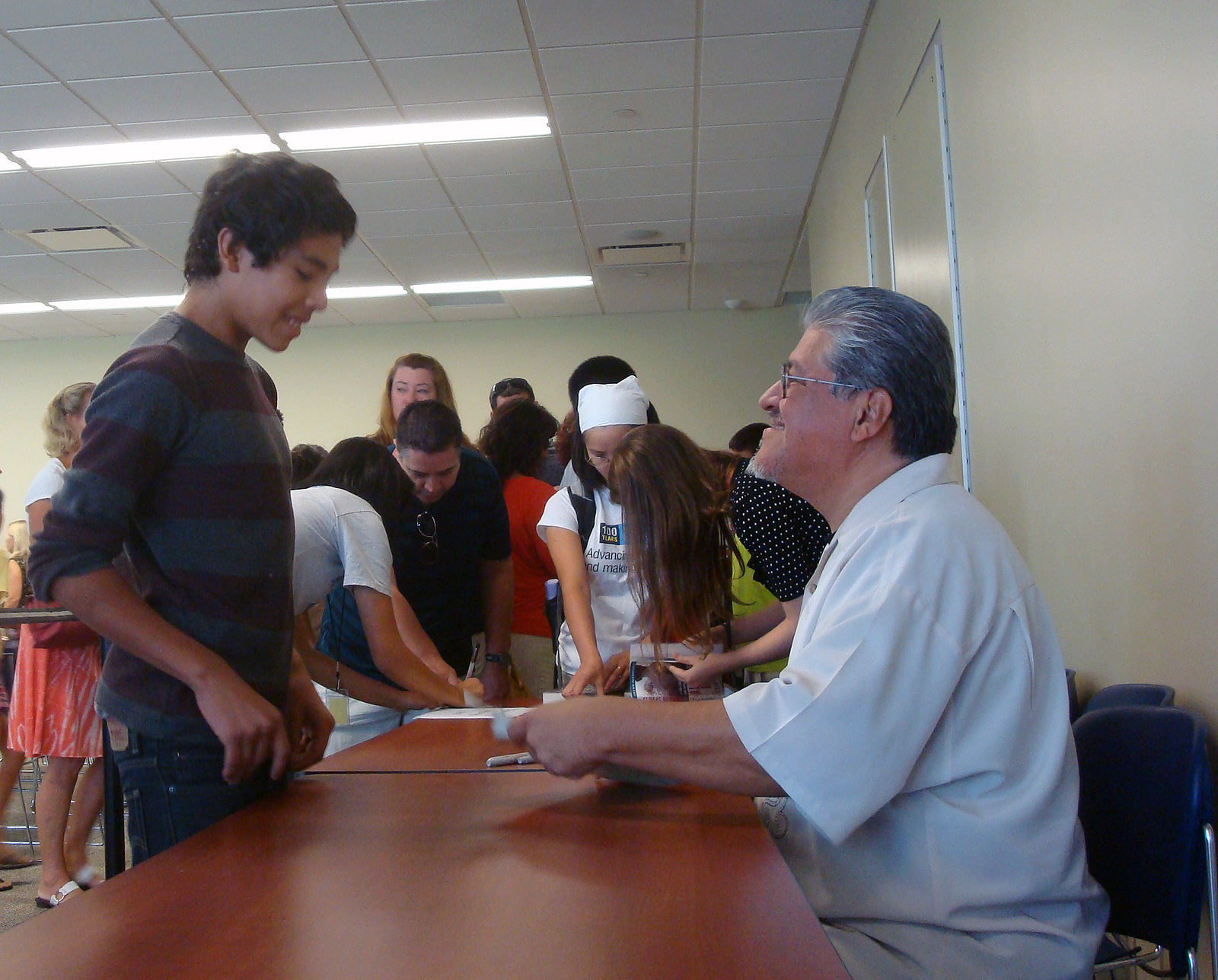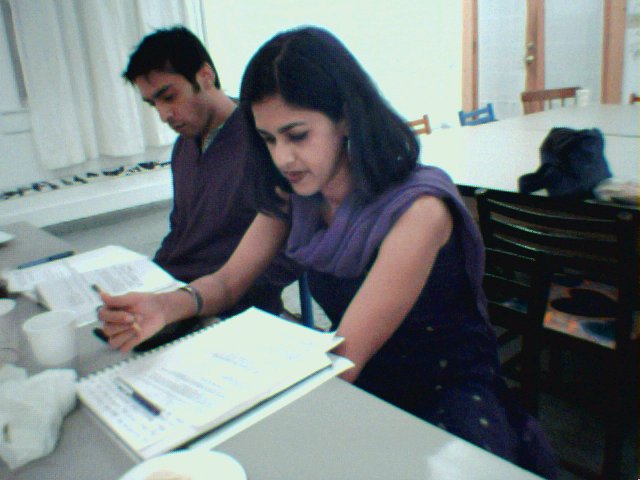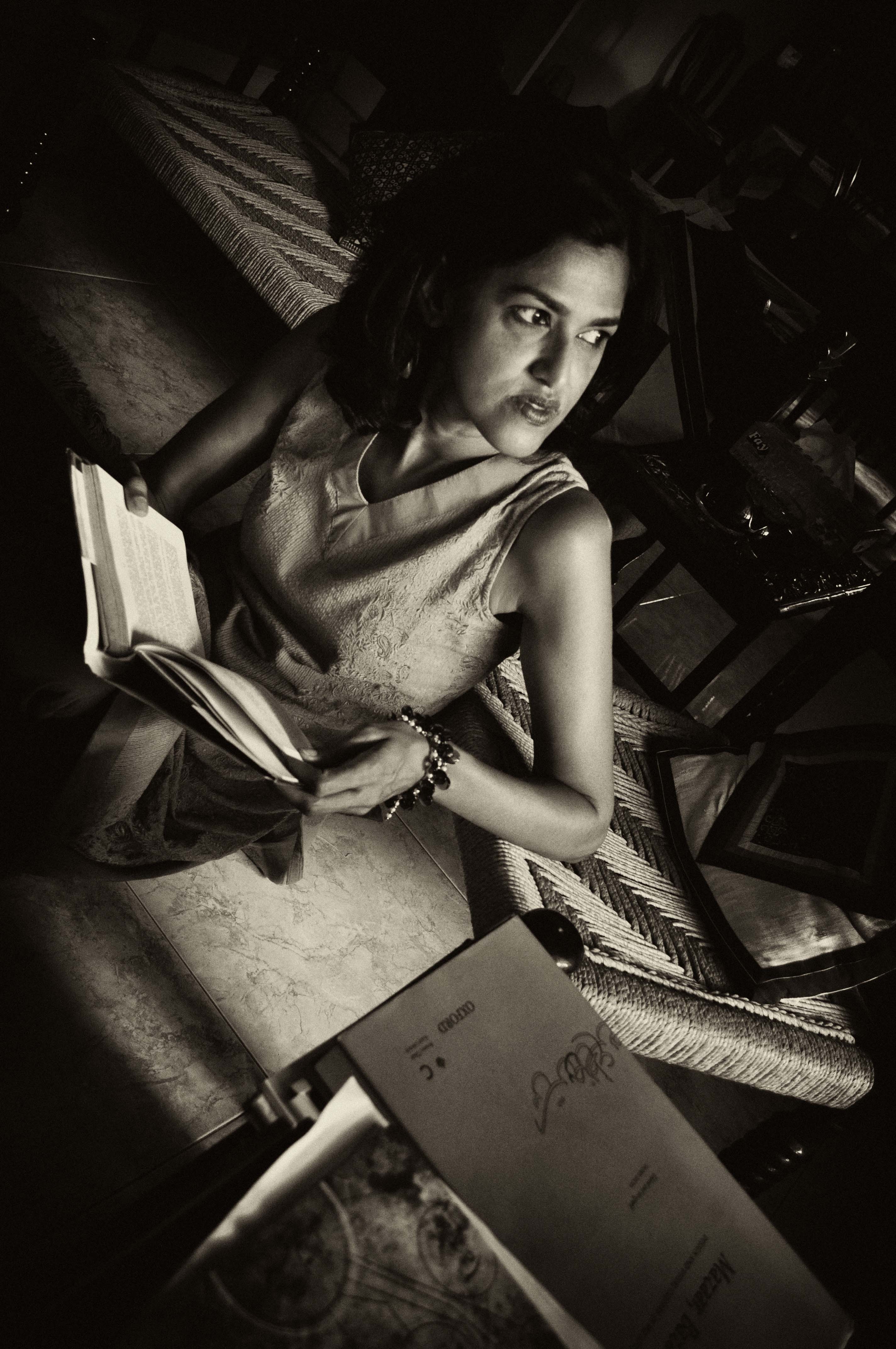On September 23, P&W-supported poet and creative nonfiction writer Luis Rodriguez gave a reading and talk at the Fullerton Public Library in Fullerton, California. P&W’s Andrew Wessels reports.
 As Sunday afternoon temperatures climbed toward triple digits, a large crowd gathered in the comfortable confines of the Fullerton Public Library’s new Community Room. Families, teachers, and high school and college students waited for the arrival of Luis Rodriguez, author of Always Running: La Vida Loca, Gang Days in L.A. and director of Tía Chucha’s Centro Cultural, in Sylmar, California.
As Sunday afternoon temperatures climbed toward triple digits, a large crowd gathered in the comfortable confines of the Fullerton Public Library’s new Community Room. Families, teachers, and high school and college students waited for the arrival of Luis Rodriguez, author of Always Running: La Vida Loca, Gang Days in L.A. and director of Tía Chucha’s Centro Cultural, in Sylmar, California.
Greeted by applause following Gustavo Arellano’s introduction, Rodriguez began his reading neither with an excerpt from one of his books nor an anecdote about his life in particular. Rather, Rodriguez began by connecting his life and the lives of everyone in the audience to Homer’s Odyssey. The connection made, though, was to Odysseus’s son Telemachus rather than the famous hero. Rodriguez wanted to talk about the process of maturation and growth, the process of finding one’s way in life.
Rodriguez read from two segments of his newest book, It Calls You Back, about the incarceration of his oldest son and his own attempts to confront his failings as a father. The first excerpt told the story of his wife’s youth, in which she chose to break free of a patriarchal family situation and become disowned in order to move away for college. The second excerpt was from a letter his son wrote shortly after being released from prison, when he was looking to redeem himself in the same way Rodriguez did from his youthful failings.
The focus on youth and maturation was the major theme of the reading. Instead of giving a straightforward reading, Rodriguez focused his energy on delivering a message: one of help and healing rather than incarceration and punishment. As a reformed gang member whose subsequent life has been dedicated to fighting gang violence and developing opportunities for inner city at-risk youth, Rodriguez’s stories carried the weight of experience and triumph.
Throughout the event, Rodriguez peppered his anecdotes—of gang life, becoming a father, finding his writing voice, and being redeemed through the guidance of dedicated mentors—with two phrases: “You know what I’m getting at” and “You know what I’m saying.” The intonation of these phrases was simultaneously a question and a statement. This duality seemed to be at the heart of Rodriguez’s message, to be simultaneously open and forceful, accepting and strong. At the end of the question and answer session, Rodriguez challenged the entire audience to provide positive opportunities so that all youths can “pick their trouble” through reading and knowledge rather than streets, gangs, and violence.
As Rodriguez left the podium and made his way to the table to sign books, nearly the entire audience gathered in a line that almost encircled the Community Room. As Rodriguez signed books and spoke to each of his readers, it was clear that his words and his works had, like he asked from all of us, created “a space to fail, to heal, and to redeem.”
Photo: Luis Rodriguez (right) signs books for fans. Credit: Andrew Wessels.
Major support for Readings/Workshops in California is provided by The James Irvine Foundation. Additional support comes from the Friends of Poets & Writers.





 th teenagers, I wanted to work more with adults. So Shaista and I began planning a workshop that spoke to the rootless-ness we both felt, whether we were in Karachi, Houston, or somewhere else. Shaista and I dedicated much thought to our workshop title—just as VBB co-founders and I had spent time honing in on the right title for “our” organization three years earlier. We finally agreed on “Voices of the Displaced,” a title that rang true for us. It also attracted a pool of Houston-based writers who were born in other countries or elsewhere in the United States, who had come from communities of color, or identified themselves as GLBT/queer. Project Row Houses offered us a meeting space and co-sponsored the series. We sent out emails inviting people to join—VBB didn’t even have a website at that time. Our first group was intimate with only six participants, but over time, the group expanded. We always brought food and drinks and our gatherings offered formal writing but also a sense of community.
th teenagers, I wanted to work more with adults. So Shaista and I began planning a workshop that spoke to the rootless-ness we both felt, whether we were in Karachi, Houston, or somewhere else. Shaista and I dedicated much thought to our workshop title—just as VBB co-founders and I had spent time honing in on the right title for “our” organization three years earlier. We finally agreed on “Voices of the Displaced,” a title that rang true for us. It also attracted a pool of Houston-based writers who were born in other countries or elsewhere in the United States, who had come from communities of color, or identified themselves as GLBT/queer. Project Row Houses offered us a meeting space and co-sponsored the series. We sent out emails inviting people to join—VBB didn’t even have a website at that time. Our first group was intimate with only six participants, but over time, the group expanded. We always brought food and drinks and our gatherings offered formal writing but also a sense of community. In Pakistan, September 21, 2012, was marked as a day of remembrance for Prophet Mohammad in response to a film that went viral and sparked violence in parts of North Africa, the Middle East, and South Asia. Knowing that the time difference between Houston and Pakistan was ten hours, I began checking online Pakistani newspapers as soon as I awoke. By the end of twenty-four hours, more than twenty people had been killed and six cinema houses had been burned. Meanwhile, progressive and secular communities that formed Pakistan’s majority were posting comments asking why extremists weren’t using their energies to offer help to the southern part of the country, where floods once again disrupted lives.
In Pakistan, September 21, 2012, was marked as a day of remembrance for Prophet Mohammad in response to a film that went viral and sparked violence in parts of North Africa, the Middle East, and South Asia. Knowing that the time difference between Houston and Pakistan was ten hours, I began checking online Pakistani newspapers as soon as I awoke. By the end of twenty-four hours, more than twenty people had been killed and six cinema houses had been burned. Meanwhile, progressive and secular communities that formed Pakistan’s majority were posting comments asking why extremists weren’t using their energies to offer help to the southern part of the country, where floods once again disrupted lives. As Sunday afternoon temperatures climbed toward triple digits, a large crowd gathered in the comfortable confines of the Fullerton Public Library’s new Community Room. Families, teachers, and high school and college students waited for the arrival of Luis Rodriguez, author of Always Running: La Vida Loca, Gang Days in L.A. and director of
As Sunday afternoon temperatures climbed toward triple digits, a large crowd gathered in the comfortable confines of the Fullerton Public Library’s new Community Room. Families, teachers, and high school and college students waited for the arrival of Luis Rodriguez, author of Always Running: La Vida Loca, Gang Days in L.A. and director of